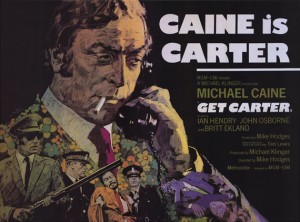With the recent release of “Harry Brown”
in the UK, Mark Farnsworth is taking a look back at the classic Michael Caine revenge film: “Get Carter.”
Launched like a British Rail heat-seeking missile, Caine’s Carter is propelled by train to his hated hometown of Newcastle to take revenge on his brother’s killers. Self-absorbed and supremely confident, Carter is the working class boy made bad. His uniform is a Saville Row three-piece suit; he travels first class, and cleans his soupspoon before eating. Every movement is precise, every put-down a masterpiece, every stare an execution.
Carter stands for family, but only in the most superficial sense. His desire to avenge his brother is due to the personal affront his murder has on the Carter name. He may show an ounce of tenderness by placing his hand gently on his dead brother’s, but even this miniscule show of affection is tarnished when Carter is seen shaving over the open coffin later.
The villains Carter is pitched against care nothing for his family values, no matter how twisted they maybe. They are out to humiliate him through the death of his brother and the violation of his niece. Kinnear and Pace are portrayed as morally defunct, framing Northern society in sex scandals that mirror Profumo. Carter is happy to be part of this social cesspool but once his family name is drowned in it, he has to act.
 Carter inhabits an England gripped by the fall out from the 60s. Weed and acid have been replaced by heroin and cocaine, free love by pornography. Celebrity gangsters like the Krays and the Richardsons have had their veneer of glamour peeled back to reveal the concrete-encased nastiness lurking beneath the David Bailey photographs. Police corruption is rife, and the only time the law is encountered is when Carter uses it for his own dark means.
Carter inhabits an England gripped by the fall out from the 60s. Weed and acid have been replaced by heroin and cocaine, free love by pornography. Celebrity gangsters like the Krays and the Richardsons have had their veneer of glamour peeled back to reveal the concrete-encased nastiness lurking beneath the David Bailey photographs. Police corruption is rife, and the only time the law is encountered is when Carter uses it for his own dark means.
This world is littered with broken relationships and adultery. Nearly every character is embroiled in a sordid affair; the destruction of the family unit is rife in “Get Carter,” with Carter as complicit as the most despicable of his enemies.
In fact, Carter is far more ruthless than any of the local gangsters he comes up against, and far more inventive. His revenge is served hot, cold, and vicious, a shockingly calculated annihilation that leaves no doubt in the mind as to how atrocious Carter truly is.
Yet as stated before, he is capable of a stunted affection. He cries (albeit privately) upon a devastating revelation and perhaps this lapse of his warped masculinity is what really sends him on his final course of terrifying action, with the dreadful outcome inevitable and necessary.
